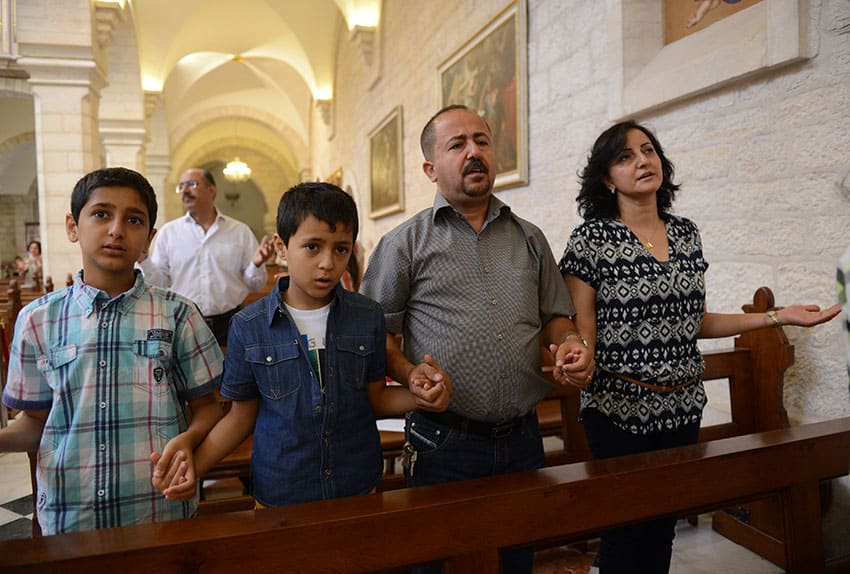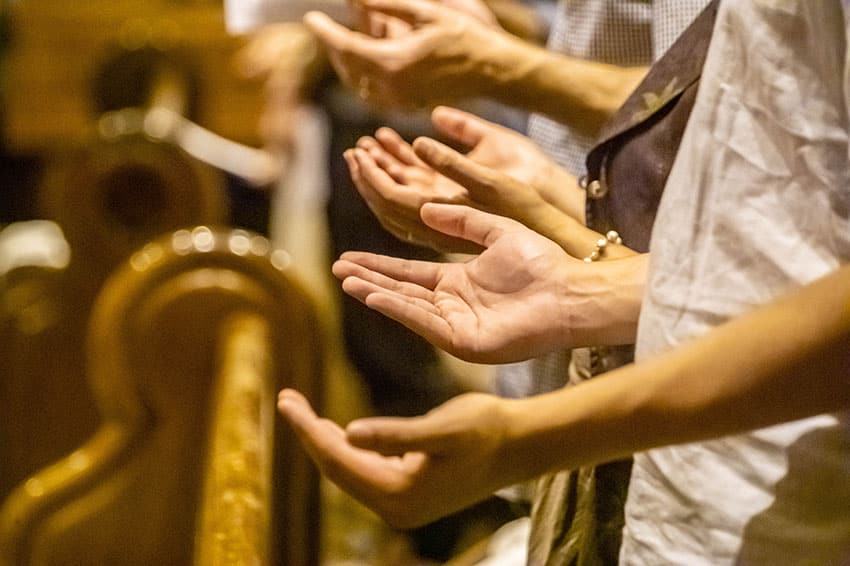
Dear Father, Some people in my parish pray the Our Father in Mass with their arms outstretched, like the priest, and I find this strange. Is it permitted? And how about holding hands with the persons on either side while saying the Our Father?
The position of praying with the arms extended is called the orans position, meaning literally “praying”. One of the first depictions of it is on a wall in the catacombs of St Priscilla in Rome from around the third century.
In the Mass, the priest holds his arms extended for all the prayers he says on behalf of the people: the opening prayer or collect, the prayer over the gifts, the Eucharistic prayer, the Our Father and following prayers, and the prayer after Communion.
For other prayers, such as the confiteor, the gloria and the creed, he has his hands folded. Any priests concelebrating with the priest celebrant adopt the same position when they are praying out loud.
So is it proper for the lay faithful to pray in the Mass with their arms extended? Strictly speaking, no.
The Instruction on certain questions regarding the collaboration of the non-ordained faithful in the sacred ministry of priests, published by the Vatican on 15 August 1997, prescribes:
“In Eucharistic celebrations deacons and non-ordained members of the faithful may not pronounce prayers—especially the Eucharistic prayer, with its concluding doxology—or any other parts of the liturgy reserved to the celebrant priest.
“Neither may deacons or non-ordained members of the faithful use gestures or actions which are proper to the same priest celebrant.
“It is a grave abuse for any member of the non-ordained faithful to ‘quasi preside’ at the Mass while leaving only that minimal participation to the priest which is necessary to secure validity” (Instruction, Practical Provisions, 6 §2).
As regards the first sentence, I once celebrated Mass in a parish church in another country where the congregation had the custom of saying, together with the priest, the doxology at the end of the Eucharistic prayer (“Through him, with him, in him”). This is expressly forbidden.
Likewise, not even deacons or other ministers officiating at the altar, such as acolytes, servers, etc., are allowed to “use gestures or actions which are proper to the same priest celebrant.” This would certainly include praying with their arms extended.

Does this include lay people in the pews? An argument could be made that it does not, since the document refers especially to the celebration of the liturgy at the altar.
But a more reliable interpretation would include the lay faithful wherever they are in the church.
If the first sentence of the passage forbids deacons and non-ordained members of the faithful saying prayers reserved to the priest celebrant, obviously including the lay faithful in the pews, the other provisions in the passage would certainly include them too.
For the lay faithful to extend their arms when saying the Our Father could give the impression that they are somehow “concelebrating” the Mass with the priest, and this is always forbidden.
Indeed, the document says that it is a grave abuse, “for any member of the non-ordained faithful to ‘quasi preside’ at the Mass.” The word “any” is inclusive of all the faithful, no matter where they may be seated.
Of interest here is the fact that in 1999, when the US Conference of Catholic Bishops sent the new ICEL sacramentary, or missal, to the Vatican for approval, it contained the provision that the orans position might be used by the faithful for the Our Father.
This provision was officially and specifically rejected by the Vatican when the new Roman Missal appeared (cf. Adoremus Bulletin, November 2003).
As regards holding hands while saying the Our Father in the Mass, this is not forbidden by any document of the church, and so it is up to each person to decide.
The US Catholic Bishops’ committee on the Liturgy in 1995 was going to prohibit it when one bishop pointed out that among African-Americans it was a common practice, and to forbid it would be considered insensitive.
Nonetheless, since many parishioners would find hand-holding strange or even unpleasant, people should only do it with others whom they know are happy with it.
